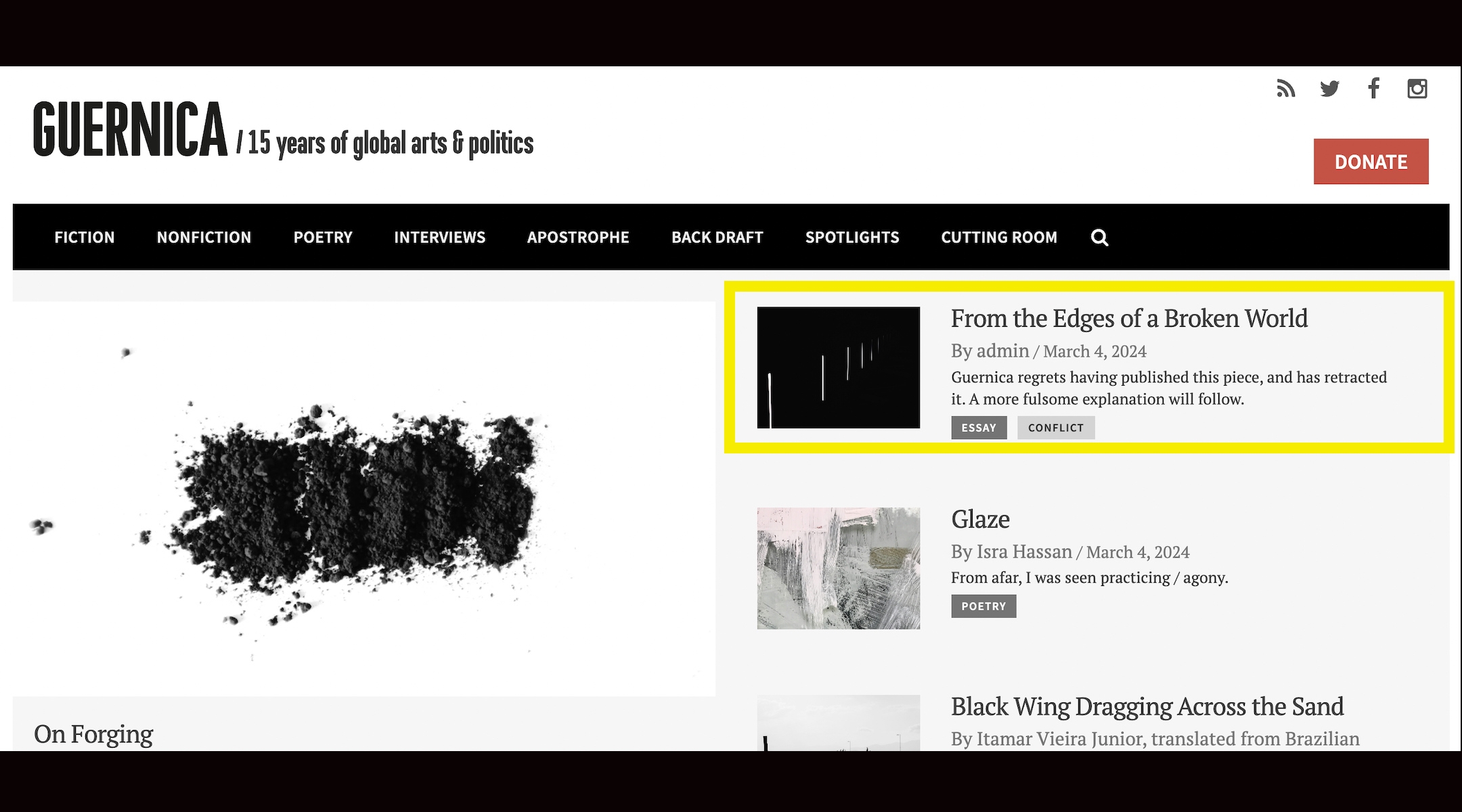(JTA) — The founder of Guernica, the progressive literary magazine that published and then retracted an essay by an Israeli writer last month, says he never wanted to publish the piece in the first place.
In a seven-paragraph statement published on Guernica’s website Friday, Michael Archer writes that he thought from the start that the essay, “From the Edges of a Broken World” by Joanna Chen, was a departure from the journal’s values.
“When Jina [Moore, the editor in chief and publisher of the magazine] called my attention to this piece, I disagreed that it was a fit for the magazine,” Archer wrote, explaining, “Rather than mine the personal to expose the political, individual angst was elevated above the collective suffering laid bare in the extensive body of work Guernica has published from the region.”
The statement, titled “Moving Forward,” appears to be the “more fulsome explanation” the publication promised in early March when it removed the essay, opening a new frontline in a broad battle over the Israel-Hamas war in the literary world. More than a dozen members of Guernica’s volunteer staff resigned to protest Chen’s essay, and Moore, who advocated for Chen’s essay, resigned earlier this month.
Chen, a British-Israeli leftist, wrote in the piece how, despite the massacre of Israelis on Oct. 7, she was trying to stay committed to her belief in Israeli-Arab coexistence. Madhuri Sastry, a co-publisher of the magazine, called the essay “a hand-wringing apologia for Zionism and the ongoing genocide in Palestine.”
In his statement, Archer says he and other members of Guernica’s volunteer staff had engaged in fierce discussions about the essay and the questions it posed both before and after its publication.
He also said he had appointed a new publisher, Magogodi aoMphela Makhene, a South African fiction writer and antiracist educator. In her own statement, Makhene wrote, “Especially in this season, I look forward to helping build a Guernica that’s alive with the messy and electric charge that is our shared humanity; a publication courageous enough to see our full complexity and offer a lighthouse illuminating our highest possibilities.”
In her first interview since the firestorm, Moore told Semafor’s Ben Smith in an interview published Monday that Chen’s essay had undergone the same editorial process as other pieces Guernica published during her tenure and rejected Archer’s suggestion that she had overridden his objections to publish it.
Moore said she found Archer’s portrayal of the essay as focusing on “personal angst” to be “dismissive.” She said she thought Chen had presented an important perspective, even though she said that in retrospect and given the feedback she had received, she might have edited it differently.
“I understood it to be asking an important question. I understood it not to necessarily find a particularly great answer,” Moore said about Chen’s essay, which has since been republished by Washington Monthly. “The sort of baseline question I understood it to be asking is: How can you operate from a position of empathy in such a moment? One of my takeaways from the piece was [that] it’s very difficult and it might not be possible.”
Smith asked Moore, who has reported from conflict zones around the world and lived extensively in East Africa, whether she saw what is happening in Gaza as “such an out-of-scale crazy set of atrocities by the Israelis” that it should not be subject to normal rules of debate and discourse. “I don’t think I’m qualified to answer that question,” she answered.
Smith also asked whether she thought the firestorm over Chen’s essay was “driven by antisemitism.” Critics of the decision to retract it said the episode was further evidence of antisemitic discourse in progressive and literary spaces.
Moore’s answer: “I’m not going to speculate about what’s inside people’s heads.”
She said she thought it was Guernica, and not Chen’s essay, that marked a departure from the 15-year-old literary magazine’s values.
“It’s not uncommon for smart people to disagree about how they interpret a piece. And I think that … in publishing, that’s a virtue and not a threat,” Moore said. “I don’t really know how to do a publication in a different way, which is one reason I knew I didn’t belong there anymore.”
JTA has documented Jewish history in real-time for over a century. Keep our journalism strong by joining us in supporting independent, award-winning reporting.






